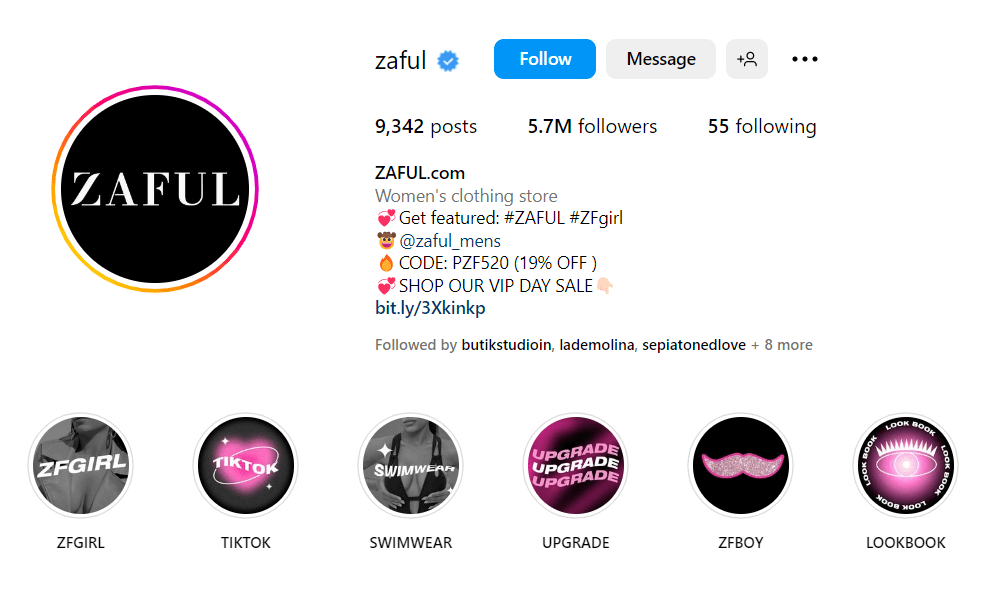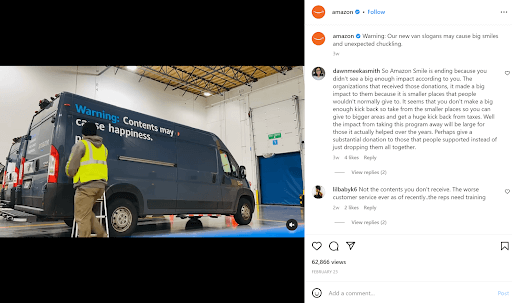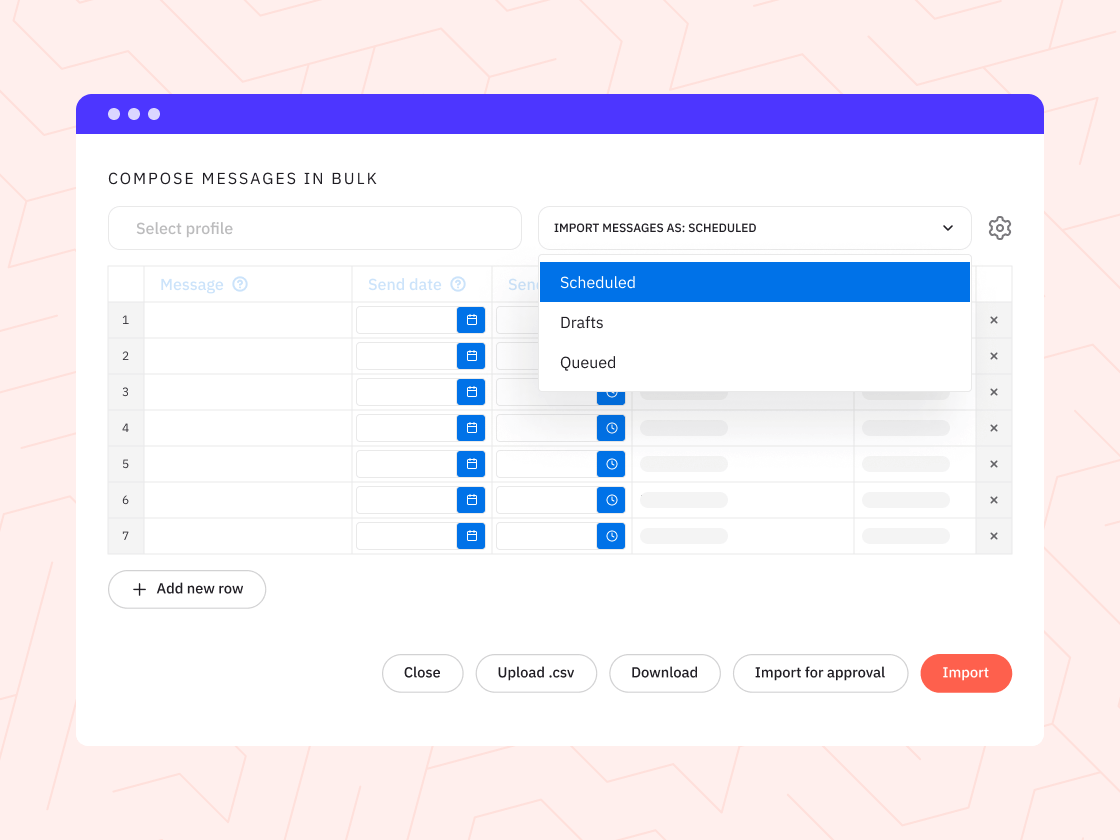Sendible insights Agency Guide: How to Set E-Commerce Social Media Up for Success
Global e-Commerce sales through social media generated $992 billion in 2022, with the figure set to increase in the coming years. Compare that to the trillions of dollars in e-commerce sales, and you will see how prominent social media has become. Still, it is one area that remains largely untapped by many retailers.
It is time to reconsider your marketing and sales strategy if you want to win in 2024.
By incorporating social media into your e-commerce strategy, you can tap into a larger customer base. And with projections showing that there will be 5.17 billion social media users by 2024 (compared to 4.90 billion in 2023), it's clear that this avenue holds immense potential for your business.
You must structure your approach to maximise your chances for success. Thriving in social media sales goes beyond creating ad posts and dropping them on your timeline. Therefore, we will show you how to position your e-commerce business to succeed on social media.
- Establish your presence
- Work around a marketing strategy
- Harness the power of storytelling
- Manage your posts
- Optimise your landing pages
- Bonus section: FAQs
Establish your presence
Do you remember how you set up your online store? You could also optimise your Google business profile to get more organic searches. Think about your efforts to establish your online presence, but this time, do it with social media.
It is time to set up your profile on the best platforms for your business. The more channels you incorporate, the more flexibility you offer your customers. However, you must pick the ones that host most of your customers.
Facebook, Instagram, YouTube, and WhatsApp have the most monthly active users. YouTube demands more video content than text or pictures. On the other hand, Facebook and Instagram favour video, text, and image posts.
Setting up your account is the foundation of your success. Then, you can determine what to post, how often to post, and other secondary factors. You might need the services of a graphics designer to set up the visuals of your profile and make them appealing.
 Source: @moonmagicjewelry
Source: @moonmagicjewelry
How to establish an e-Commerce social media presence
Different social media channels have different approaches to creating new accounts. However, they often begin by entering a name and uploading some profile and cover pictures. This information is what people will see first before visiting your timeline.
You can generally set up an account by following the steps below:
- Set up a new page with your business name and details.
- Provide supporting information like email, address, website URL, and working hours.
- Set up a few buttons, like "message," "contact now," "visit website," etc.
- Add a banner image.
- Write a brief description of the page and ensure to include keywords and relevant information.
 Source: @zaful
Source: @zaful
Setting up your page is the first step, but it doesn’t create awareness. At this point, your e-commerce business will only appear in organic searches. So, you need a clear advertising strategy to create awareness and let people know you are available.
Before we get to the marketing strategy, you can start with your website or e-commerce store. Building backlinks on your website can direct people to your social media pages.
Work around a marketing strategy
Getting lost in the tools available for social media marketing is easy. You need a clear strategy to use them effectively.
A sponsored post is often the first port of call for e-commerce businesses, and for a good reason. These ads are placed on timelines other than organic search results. However, posting without tweaking a few things will make your posts ineffective.
Your marketing strategy will be incomplete without copywriting or text input. You can have excellent products but still lack the required response. The key is making them as compelling as possible, and copywriting is one way to do it.
Let’s try a few ways to set up your e-commerce social media ads for success.
Define your target market
Marketing your product to the wrong market is critical to product failure. So, step back and define your target social media audience before you pump money into sponsored posts.
Fortunately, many social media platforms that run sponsored ads allow for demographic targeting. You can set your posts to appear to users in a specific region or within an age group. These settings help narrow your advertisements to those most likely to buy them.
For example, marketing a new and sleek laptop to a 70-year-old retiree will be unwise. Do that to a young person below 40, and you will have the most engagement.
Create ad campaigns
Once you have defined your target market, you can launch your ad campaigns. A campaign is not one post but a series of posts. They will carry your products as well as your calls to action.
Sometimes, you must let your ads run for weeks. Established e-commerce businesses can get away with running their ads for shorter periods. Remember that you may need about seven sightings to form an impression.
One ad copy is not enough, especially for new e-commerce businesses. Regardless of expertise, you can only tell what will work once implemented.
It is better to create two ad copies and monitor their engagement. Then, you can cut off the one with fewer engagements and reinforce the one with more engagements.
Types of e-commerce social media ads
You can advertise your products differently. Social media channels allow different ways to incorporate ads. For example, YouTube does it by embedding videos and YouTube Shorts.
Identify what the social media platform supports and work with that. Notwithstanding, social media ads include the following:
- Images
- Carousels
- Text
- Short-form video
- Videos
Image ads
The most common types of advertisements on social media are images and pictures. They are visually appealing and more readily understandable than a block of text. For an e-commerce business, posting pictures of your products is a great way to start.
For example, Moonboon, kids and baby studio, paired a giveaway and new product promotion to create a captivating image-based ad.
 Source: @Moonbooncom
Source: @Moonbooncom
Carousel ads
A carousel is a more refined way of posting product pictures. It also allows easy backlinking and calls to action to your landing page or website. Your viewers can quickly swipe right to see more or click the post to visit the checkout page.
 Source: @tb_serbia
Source: @tb_serbia
Text ads
The text is good, but it shouldn’t form the centre of your posts. You can use it to support other types. Using texts alone will have little engagement with the quick-swiping nature of social media platforms.
Short-form video ads
When we say short-form video ads, we mean vertical, short, attention-grabbing videos.
Stories, Reels, Shorts. They have different names and purposes, but at the end of the day, these short-form video are available on most social media platforms, including TikTok, Instagram, Facebook, and YouTube. And you can use them to promote your online shop.
Short-form videos are the leading social media trend, so this format might be your golden ticket to increasing sales.
 Source: @bellabarnett.official
Source: @bellabarnett.official
Video ads
Many marketers believe video ads are effective in generating sales leads. Video content creates more engagement than other forms of social media advertising. However, you must do it right.
You can create stock videos or make custom videos for your product. The key is to create something relatable for your target market.
Back up your marketing campaign with videos to create more lasting impressions. We do not imply that you should use video content in your advertisement. Yes, there will be room for images and text.
Copywriting does not end with text ads. Your videos will have audio, and you must define what will be communicated.
Instagram is an ideal platform for video ads. The screenshot below is from an Amazon video post, which is an excellent example.
 Source: @amazon
Source: @amazon
- Log into your Instagram account.
- Click “Create” in the side menu.
- Drag and drop the video or select from the folder.
- Add a description/edits.
- Once you publish it, you can go ahead and sponsor it.
Harness the power of storytelling
We have covered the basics of establishing your presence and running ad campaigns for your products. However, success still boils down to how engaging your posts or advertisements are.
You can get away with selling a product that is in high demand. But you should remember that you are competing with other e-commerce businesses. It is best to go the extra mile in making your advertisements as engaging as possible.
Make your posts count
All your posts do not need to be about selling your products. Some should get people to like and follow your social media page. To do that, you need to understand your target audience.
Plug into their identity and needs. People often engage with what they can connect with. Hence, you want to make your brand as relatable as possible.
You can use stories to reinforce your brand’s values and what you stand for. Don’t end at your products; expand to your history, mission, goals, and inspiration. When doing that, remember to include hashtags to boost your visibility.
You don’t have to direct all your posts for sales. Use 20% of them to directly promote your business, while the rest should be on general information, entertainment, and entertainment.
Collaboration is an excellent way to gain visibility. Tiktok, for example, offers stitches and duets for reposts. Also, you can use Instagram partnerships to add partner brands for more boosts.
Here are a few ideas for your posts:
- How-to posts (explanatory)
- Open questions for engagements
- Polls
Manage your posts
A few posts down the line, and you may need more ideas. Your ads might run fine, but your page’s engagement becomes stagnant. That shows that fewer people are interested in your brand.
Marketers have social media publishing tools, but you can also use them for your e-commerce business. They will help you schedule your workflow, but you can do much more.
Social media management encompasses the following:
- Post scheduling
- Grouping campaigns
- Image optimization
- Graphics design
- Media Integration
- Bulk campaign creation
You will get to a stage where your e-commerce social media page is better off in the hands of an expert. The best approach is to engage a social media manager from the start. However, you can start independently if there is a cash constraint.
Optimise your landing pages
Although landing pages exist outside social media platforms, they are paramount to your success. Ensure your products have well-designed checkout pages when people click on them from your posts. For example, no one wants to be redirected to a laptop checkout page after clicking on a bag product.
Take the time to ensure that your landing pages are linked to the relevant posts. If necessary, engage a website design and development professional to optimise them for quick checkouts. Online buyers often abandon their shopping carts if the checkout process is ineffective.
Wrapping up
Using social media to promote your e-commerce business can increase sales. Social media channels offer an engaging platform to connect with potential customers. However, you must first optimise your page and define your target market before you launch your ad campaigns.
Images, carousels, and videos are the most effective social media ads, but you need copywriting to back them up. The latter creates the persuasion needed to convince people to click on your ads.
Creating ads is one of many deciding factors for success in social media. Connect and relate to your potential customers through storytelling. Make posts that portray your brand’s vision, goals, inspiration, and history.
Bonus section: FAQs
What is a landing page?
A landing page is where viewers go after clicking a product link in your social media posts. It could be a checkout or description page for the product.
Do I need a social media manager?
Getting a social media manager is a matter of efficiency and expertise. You will not always have the time to create posts when managing product supply and other logistics.
Which social media platforms can I use?
You can set up your e-commerce business on Facebook, Instagram, YouTube, TikTok, LinkedIn, X (Twitter), etc. Choose the one that best serves your target market.
Andrew Maffetone
With his knowledge of marketing and business strategy, love for staying ahead of the curve, and ability to execute effective marketing solutions, Andrew Maffetone created BlueTuskr, a team of specialized experts dedicated to the growth and success of e-commerce sellers.
Text copied!





